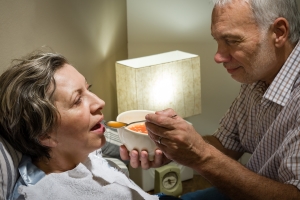Signs of Caregiver Burnout
The Importance of Caregiver Respite
Everyone needs a break - especially caregivers. Respite care provides caregivers a temporary rest from caregiving, while the person with Alzheimer's continues to receive care in a safe environment. Using respite services can support and strengthen your ability to be a caregiver.
The Journal of American Medical Association reports that if you are a spousal caregiver between the ages of 66 and 96, and are experiencing ongoing mental or emotional strain as a result of your caregiving duties, there's a 63% increased risk of dying over those people in the same age group who are not caring for a spouse. As a caregiving spouse, you may begin to feel very isolated from friends and feel tremendous guilt about your own unmet needs.
Importance of Respite for CaregiversRespite care can be provided at home - by a friend, other family member, volunteer or paid service - or in a care setting, such as adult day care or residential facility. Home care offers a range of options including:
- Companion services to the individual with companionship and supervised activities
- Personal care or home health aide services to provide assistance with bathing, dressing, toileting and exercising
- Homemaker or maid services to help with laundry, shopping and preparing meals
- Skilled care services to help with medication and other medical services
Adult day centers offer a place where the person with Alzheimer's can be with others in a safe environment. Staff leads planned activities, such as music and art programs. Transportation and meals are often provided.
Residential care facilities may offer the option for a stay overnight, for a few days or a few weeks. Overnight care allows caregivers to take an extended break or vacation while the person with dementia stays in a supervised, safe environment. The cost for these services varies and is usually not covered by insurance or Medicare.
Most often respite care takes place in the families own home where professional care-givers provide an opportunity for parents to have some time to themselves including:
Relaxation. Respite gives families peace of mind, helps them relax, and renews their humor and their energy;
Enjoyment.
Respite allows families to enjoy favorite pastimes and pursue new activities;Stability. Respite improves the family's ability to cope with daily responsibilities and maintain stability during crisis;
Preservation. Respite helps preserve the family unit and lessens the pressures that might lead to institutionalization, divorce, neglect, and child abuse;
Involvement. Respite allows families to become involved in community activities and to feel less isolated;
Time Off. Respite allows families to spend time together and alone; and
Enrichment. Respite makes it possible for family
members to establish individual identities and enrich their own
growth and development.
Finding someone qualified to care for your loved one can be overwhelming. The care of a family member with multiple and severe physical disabilities is a 24-hour-a-day commitment.
Here are some important questions to ask:
- How are your care providers screened?
- What is the training and level of experience of the care providers?
- Will care providers need additional training to meet specific family needs?
- How, and by whom, are the care providers supervised?
- What procedures does the program have for emergencies?
- Are families limited to a certain number of hours of services?
- Does the program provide transportation?
- What is the cost of services? How is payment arranged?
Find a Caregiver Support Group Near You
About Caregiver Burnout
Everyone needs a break. Respite is a service in which temporary care is provided to children or adults with disabilities, or chronic or terminal illnesses. Respite can occur in out-of-home and in-home settings for any length of time. Caregiver burnout is a state of physical, emotional, and mental exhaustion that may be accompanied by a change in attitude -- from positive and caring to negative and unconcerned. The signs and symptoms of caregiver burnout are similar to the symptoms of stress and depression.
Common
signs and symptoms of caregiver stress include:
- Anxiety, depression, irritability.
- Feeling tired and run down.
- Difficulty sleeping.
- Overreacting to minor nuisances.
- New or worsening health problems.
Respite is a vital resource especially for a spouse caring for a loved one with Alzheimer's, Parkinson's Disease or any other condition which requires constant care.
Related Articles:
Home | About | Articles | Resources | Site Map | Privacy Policy
Elder Options of Texas
Copyright 2001-2024
All Rights Reserved
DISCLAIMER: Links to other websites or references to products, services or publications do not imply the endorsement or approval of such websites, products, services or publications by Elder Options of Texas. The determination of the need for senior care services and the choice of a facility is an extremely important decision. Please make your own independent investigation.



